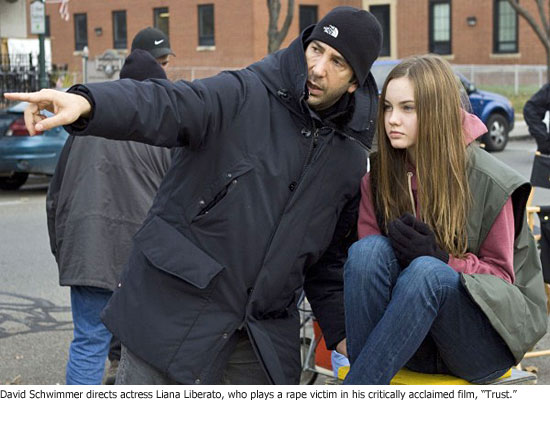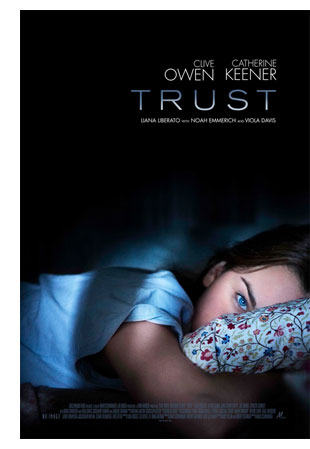Rape survivors have a Hollywood friend
April 7, 2011
 Fourteen years ago, as a star on the hit TV show “Friends,” David Schwimmer agreed to appear in one of NBC’s “The More You Know” public service announcements.
Fourteen years ago, as a star on the hit TV show “Friends,” David Schwimmer agreed to appear in one of NBC’s “The More You Know” public service announcements.
The request came from Gail Abarbanel, founder and director of the Rape Treatment Center at Santa Monica-UCLA Medical Center. And the more Schwimmer got to know about the center, he says, the more inspired he became.
“Two former relationships I had were with women who had been victims of child sexual assault,” he remembers, “and one had also been a victim of date rape. And it was also at a time when I was in that first flush of celebrity, and being approached by dozens of people who wanted me to loan my celebrity to their causes.”
Searching for a place where he could make a real difference, Schwimmer says, he found himself “just amazed by the work Gail and others at the center were doing.”
The PSA—on date-rape drugs—ended up being just a beginning. Last week, Schwimmer, now a director, released “Trust,” a family drama steeped in his work with the center and its funding arm, the Rape Foundation, where he has been a board member for the past decade.
“There are just countless things in the film that reflect the work and the goals of the Rape Treatment Center,” says Schwimmer, speaking by phone from New York, where he and his wife, photographer Zoe Buckman, are expecting their first child.
The movie—about a 14-year-old girl’s life-altering encounter in an online chat room—features acclaimed performances by Catherine Keener and Clive Owens, two of Hollywood’s most skilled actors. But in many ways, the Rape Treatment Center is a star, too.
Located on Sixteenth Street in Santa Monica, the center for years has provided free state-of-the-art treatment, counseling and forensic services for sexual assault victims, as well as training for law enforcement and educational and prevention programs. It’s still the only facility in Los Angeles—and one of the few in the country—where sexual assault victims can receive services 24 hours a day, in one place.
Among its most innovative programs is Stuart House, a special facility for children that has become a national model for treating and interviewing child victims and coordinating services so kids don’t have to be re-traumatized by multiple interviews with police, prosecutors and child protection workers.
Schwimmer says the center’s work informed the script on many levels, from the dialogue to the portrayal of police procedure to the way a crime can impact every member of a family.
At one point, a character diminishes the impact of an acquaintance rape because the attacker didn’t use physical violence—a misconception commonly dealt with at the center. At another, an investigation is delayed by a massive backlog of untested “rape kits,” like the tens of thousands that had been warehoused in Los Angeles.
An FBI agent in the film is named for Doug Hunt, a real FBI agent who for years was a consultant to the center, says Schwimmer. And a therapist named “Gail” has a key role in the story.
“She and I have become really close,” Schwimmer says of the real Gail, who founded the Rape Treatment Center in 1974 and has shepherded it into a national model for rape treatment. “She works harder and longer and more passionately than any person I’ve ever met in any profession. She’s the most selfless person I’ve ever met. She really is an inspiration to me.”
The feeling is mutual, says Abarbanel. “I really feel like David took so much of what he’s been a part of for all these years, and incorporated it into this great film. I have gotten so much feedback from people on this movie. It really brings home so many issues parents deal with, so many questions about how to keep your kids safe.”
Although the performances have drawn raves, the early box office has been modest. “I knew it would be a challenge to get people into the theater,” says Schwimmer, “but it’s a great dramatic story.”
And an important one, he and Abarbanel add: One in six women has been a victim of rape or attempted rape. One in four girls, and one in eight boys, is sexually assaulted before they reach 18.
“My hope was not only that people would be moved and entertained, but that it would invite more discussion between parents and kids on a whole range of issues,” says Schwimmer, especially about the dangers of the Internet.
“It used to be that when some stranger came to your door, you could look out the peep hole and tell him to go away,” he says. “Now there are a hundred strangers knocking on your kids’ door every day. And you’re not always going to be there to intervene.”
Posted 4/6/11












 405 bridge work causes a stink
405 bridge work causes a stink





